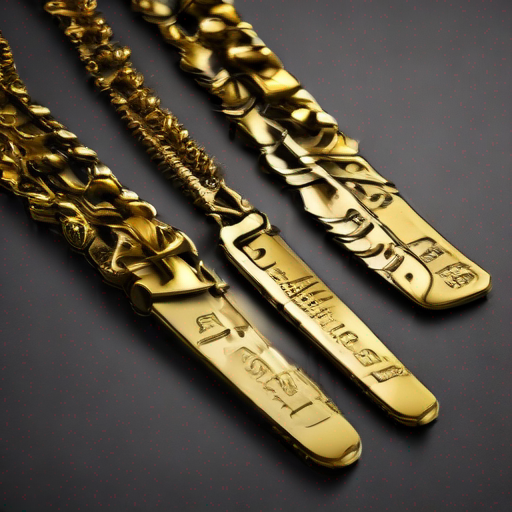History of Gold Chain: Unlocking the Timeless Elegance of Gold Chain by History

History of Gold Chain: Unlocking the Timeless Elegance of Gold Chain
Gold chains have been a staple in jewelry collections for centuries, exuding an air of sophistication and luxury. From ancient civilizations to modern-day fashion trends, gold chains have evolved alongside human history, reflecting the values and aesthetics of each era. In this article, we'll delve into the fascinating history of gold chain, exploring its origins, cultural significance, and enduring appeal.
Ancient Roots
Gold chains date back to ancient Mesopotamia (modern-day Iraq) around 3000 BCE. The Sumerians, Babylonians, and Assyrians prized gold for its rarity and durability, crafting intricate chains as symbols of wealth, power, and status. These early gold chains often featured ornate designs, such as serpents, lions, or gods, highlighting the wearer's social standing.
Renaissance Revival
During the Renaissance (14th-17th centuries), gold chains experienced a resurgence in popularity. As trade routes expanded and wealth increased, gold became a sought-after material for jewelry making. European monarchs and nobles commissioned elaborate chain designs, often featuring intricate engravings or gemstones. This era saw the rise of the famous Medici family in Florence, Italy, who popularized ornate gold chains as status symbols.
Victorian Era
The Victorian era (1837-1901) is often associated with opulence and excess, and gold chains were no exception. The Industrial Revolution brought mass production techniques, making gold jewelry more accessible to the masses. Gold chains became a staple in ladies' fashion, adorned with cameos, lockets, or other sentimental charms.
Art Deco Era
In the Roaring Twenties (1920s), gold chains entered the realm of Art Deco, characterized by geometric shapes, clean lines, and minimal ornamentation. This era saw the rise of celebrity icons like Greta Garbo and Clark Gable, who wore gold chain necklaces as a symbol of glamour.
Modern Era
In recent decades, gold chains have continued to evolve alongside changing fashion trends. The 1970s saw the emergence of chunky, oversized chains, while the 1990s popularized delicate, minimalist designs. Today, gold chains are worn by both men and women, often layered with other jewelry or used as a statement piece.
Cultural Significance
Gold chains have played a significant role in various cultures:
- African: In many African cultures, gold chains represent wealth, status, and spiritual connection.
- Indian: In Hinduism and Sikhism, gold chains symbolize prosperity, good fortune, and devotion to the gods.
- Christian: In Christianity, gold chains may signify purity, innocence, or divine favor.
Key Takeaways
| Era | Characteristics | Significance |
|---|---|---|
| Ancient Mesopotamia | Intricate designs, symbols of wealth and power | Status symbolization |
| Renaissance | Ornate engravings, gemstones, and status symbols | Representation of wealth and social standing |
| Victorian Era | Opulence, excess, and sentimental charm | Symbolism of luxury and romance |
| Art Deco Era | Geometric shapes, minimal ornamentation, and glamour | Representation of sophistication and elegance |
| Modern Era | Evolution alongside changing fashion trends | Versatility and adaptability |
Conclusion
The history of gold chain is a rich tapestry woven from diverse cultural influences, technological advancements, and shifting social values. As we navigate the ever-changing landscape of fashion and personal expression, it's clear that gold chains will continue to hold their allure as timeless symbols of elegance, sophistication, and luxury.
For those looking to make a statement with a personalized touch, consider a gold chain with my name – a unique and thoughtful gift for yourself or someone special. Visit https://ratherpretty.com/gold-chain-with-my-name-the-ultimate-personalized-jewelry/ to explore the ultimate in customized jewelry.
References
- "The History of Jewelry" by The Metropolitan Museum of Art
- "A Brief History of Gold Jewelry" by Jewelry Notes
Disclaimer
The information provided is for general purposes only and should not be considered as a substitute for professional advice. All references are provided for informational purposes only.

